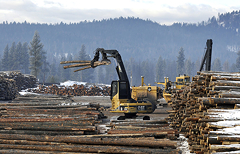Canadians face new tariffs after US softwood ruling
03/11/2017 12:00

U.S. Commerce Department officials have ruled that Canada unfairly subsidizes the cost of logs it provides to Canadian timber companies, setting the stage for new tariffs on wood imports to the United States.
If the decision announced Thursday is approved by the International Trade Commission in December, Canadian companies would have to pay an average 20 percent tariff on the value of softwood delivered to U.S. customers. The move also increases pressure on negotiators of a new softwood lumber agreement between the United States and Canada.
“We’ve been waiting for this,” said Sherm Anderson of Sun Mountain Lumber in Deer Lodge. “It shows the Commerce Department agrees with what we the lumber producers have been trying to tell them, that there was an export violation, and their government does subsidize their industry. Now either the ITC rules in December that we can impose the tax, or it drives the Canadians back to the table for an agreement that’s permanent.”
The Canadian government warned it might seek legal sanctions of its own through the North American Free Trade Agreement or the World Trade Organization.
“The U.S. Department of Commerce’s decision on punitive countervailing and anti-dumping duties against Canada’s softwood lumber producers is unfair, unwarranted and deeply troubling,” Foreign Affairs Minister Chrystia Freeland and Natural Resources Minister Jim Carr said in a joint statement published on the Vancouver Sun news website.
“We urge the U.S. administration to rescind these duties, which harm workers and communities in Canada. These duties are a tax on American middle class families, too, whose homes, renovations and repairs will only be more expensive.”
A previous softwood lumber agreement expired in 2015, although it was provisionally extended for a year to work out a new deal. The moratorium on trade litigation ran out in October 2016, and U.S. lumber interests started calling for trade sanctions on Canadian wood. President Donald Trump imposed a 20 percent import tax on Canadian softwood lumber in April.
“We are pleased the U.S. government is enforcing our trade laws so that the U.S. lumber industry can compete on a level playing field,” U.S. Lumber Coalition co-chairman Jason Brochu wrote in an email statement. “The massive subsidies the Canadian government provides to their lumber industries have caused real harm to U.S. producers and their workers. With a fair-trade environment, the U.S. industry, and the 350,000 hardworking men and women who support it, have the ability to grow production to meet much more of our country’s softwood lumber demand.”
The past 12 months have been a roller coaster for the North American lumber market. Anderson said after the softwood agreement talks collapsed last October, Canadian firms upped their exports by about 30 percent while the agreement’s price controls were deactivated. That drove down lumber prices for a while, until Trump’s border tax went in place. Canadian wood prices grew by the amount of the tax, and U.S. lumber producers raised their prices as well.
U.S. construction also started growing, both with new housing starts and the surge of repair and remodel work triggered by a summer filled with hurricanes and tornado damage. Then came fire season.
“They burned 3 million or 4 million acres up in British Columbia,” Anderson said. “They had to shut some mills down completely because they put all their workforce out fighting fires on the crown (government-owned) land. Some of those mills were located right amongst those fires. That drove the markets up to where we’re at today.”
U.S. customers bought about $5.6 billion worth of Canadian lumber in 2016. Canadian-based companies also own about a third of the lumber production in the U.S. Southeast, where most American lumber is grown and milled.
Source: Missoulian
Các tin khác
- Find opportunities in niche markets to increase exports (15/04/2024)
- US extends conclusion on tax evasion probe into Vietnamese wooden cabinets (15/04/2024)
- Italy remains Vietnam's largest iron and steel import market (15/04/2024)
- Does the EU have what it takes to fight China on green tech? (15/04/2024)
- Not enough evidence to investigate Chinese HRC: businesses (15/04/2024)
 Home
Home
 About Us
About Us




















